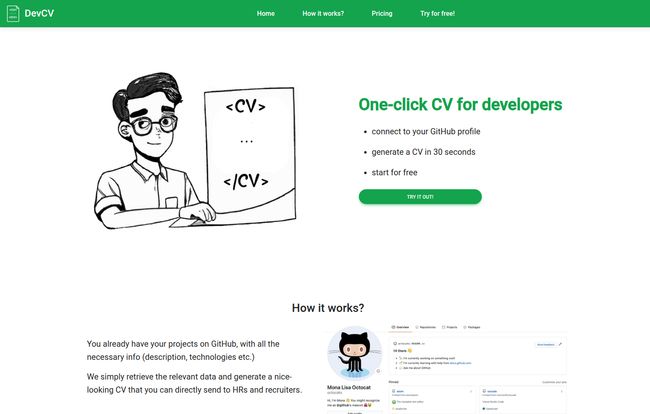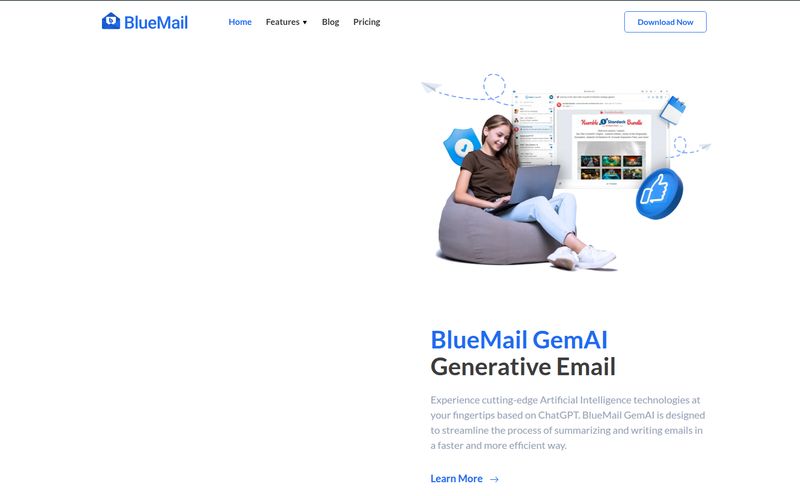If you’re a developer, the absolute last thing you want to do is write a CV. We live in a world of elegant code, logical systems, and clear commit messages. Then, suddenly, you’re expected to become a master wordsmith, a marketing guru, a poet of professional achievements. It’s a context switch that gives you whiplash.
I’ve been there. I’ve spent entire weekends agonizing over bullet points and action verbs, trying to translate a complex backend refactor into something a non-technical HR person can understand, and frankly, it’s soul-crushing. Your work, your real work, is all sitting right there on your GitHub profile. All those green squares, those detailed pull requests, those beautifully structured repos. That’s your real resume.
So when I stumbled across a tool called DevCV that promised to turn my GitHub profile into a slick, professional CV in “one click,” my inner skeptic raised a very prominent eyebrow. Another one of these tools, I thought. But the promise was too tempting to ignore. A 30-second CV? I had to see this for myself.
What is This DevCV Thing Anyway?
At its core, DevCV is a clever bit of automation built for people like us. It’s a web-based platform that connects to your GitHub account, sucks in all the relevant data about your pinned repositories and profile information, and then spits out a formatted, downloadable PDF resume. Simple as that.
But the real kicker isn't just pulling data—it's the AI layer on top. It claims to write your project descriptions and summaries for you. For any developer who’d rather debug a legacy system than write a compelling blurb about their own work, this is the siren song. It’s designed to eliminate the most painful part of the process: the actual writing.

Visit DevCV
The Magic Behind the Curtain: How It Actually Works
Okay, so “one-click” is a bit of marketing flair, but it's not far off. The process is ridiculously straightforward. You land on their site, you hit the “Try it out!” button, and you authorize it with your GitHub account. There’s no sign-up form, no new password to remember, no email verification loop to jump through. I can’t stress how much I appreciate this. It’s a huge green flag in my book.
Once connected, the AI gets to work. It’s like a translator for your career, converting your code history into a language recruiters can understand. It grabs your pinned projects, analyzes the descriptions you’ve already written in your README files, and then enhances them. It crafts a professional summary based on your profile, turning your raw technical output into a coherent narrative. You see a preview, you can make tweaks, and then you’re ready to download.
The entire thing felt less like a chore and more like a magic trick. A very practical, time-saving magic trick.
My Honest Take: The Good, The Bad, and The Code
I ran my own GitHub profile through it, and I have some thoughts. This isn’t just another shiny object; there's real substance here, but it's not perfect. Nothing ever is.
What I Genuinely Liked
First off, the speed. It’s fast. Ridiculously fast. From landing on the page to having a downloadable PDF was probably under two minutes, and most of that was me reading the text. The 30-second claim isn't an exaggeration if you just click through.
The no-registration policy is a massive win. In an age where every service wants to own a piece of your digital identity, just using GitHub OAuth and getting on with it is refreshing. It shows a fundamental respect for the user's time and privacy.
The AI-generated content was also surprisingly solid. Was it a literary masterpiece? No. But was it a better starting point than a blank Word document? Absolutely. It took my somewhat dry, technical project descriptions and fluffed them up with the right kind of action verbs and benefit-oriented language. The best part is that you're not stuck with it; with unlimited updates, you can take that AI draft and polish it into your own.
Where It Could Be Better
Now, for the critiques. The pricing is pay-per-download. For me, this actually makes a lot of sense for a CV builder—you only need it when you’re actively job hunting. But some folks might prefer a one-time purchase or a small subscription for peace of mind. It’s a matter of preference.
My only real gripe is the logo on the Basic plan. Putting a tool's branding on your personal resume just feels a bit… tacky. It subtly signals to a recruiter that you took a shortcut, and a cheap one at that. Honestly, for the price of a cup of coffee, the Premium option to remove it is a no-brainer. I wouldn't even consider sending out the branded version.
Let's Talk Money: The DevCV Pricing Structure
The pricing is refreshingly simple, which I love. No confusing tiers or hidden fees. It’s straight up.
| Plan | Price | Key Feature |
|---|---|---|
| Basic | $1 per download | Includes all features but places a DevCV logo on the document. |
| Premium | $2 per download | Identical to Basic, but with no DevCV logo. |
Both plans give you the same core functionality: no registration, unlimited CV updates, PDF download and access to the AI tools. The only difference is that two-dollar bill gets their logo off your resume. In my opinion, it’s the only option to consider for a serious job application. Think about it: how much is an hour of your time worth when you're wrestling with formatting a document? I'd wager it's a lot more than two dollars.
Who is DevCV Actually For?
This tool isn't for everyone, but for its target audience, it's a bullseye. I see it being most valuable for a few key groups.
- The Junior Developer: Just graduated from a bootcamp or self-taught? Your GitHub is your lifeblood. DevCV lets you turn that hard work into a presentable CV instantly, so you can focus on what matters: applying for jobs and crushing technical interviews.
- The Busy Senior Dev: You're not actively looking, but a recruiter from a FAANG company just slid into your DMs. You need an updated CV, like, yesterday. This is your emergency button.
- The Freelancer or Consultant: You need to tweak your CV for every new gig to highlight specific projects. With DevCV, you can re-pin different repos on GitHub and generate a new, tailored CV in minutes.
Who isn't it for? If you need a multi-page academic curriculum vitae with a list of publications, this isn't it. If you're a designer who needs a highly visual, custom-designed portfolio, you'll want more control. But for 90% of software developers, this hits the mark.
The Bigger Picture: GitHub as the Source of Truth
This tool is part of a larger, healthier trend in the tech industry. For years, we've been moving towards using GitHub as the ultimate professional portfolio. It’s more honest than a self-reported list of skills on LinkedIn. A GitHub profile shows, it doesn’t just tell. You can see the code quality, the collaboration through pull requests, the consistency of contributions. It’s the ground truth.
Platforms like DevCV are just building the necessary interface on top of that truth. They’re acknowledging that your value is in your `main` branch, not in your ability to master Microsoft Word. It's a philosophy I can get behind, and one that organizations like freeCodeCamp have been championing for a while.
So, Should You Use DevCV?
Look, if you enjoy crafting resumes, meticulously adjusting margins, and debating the merits of Times New Roman vs. Garamond, then by all means, carry on. You do you.
But if you’re a developer who would rather be writing code, solving problems, or doing literally anything else, then yes. Absolutely. For two bucks and less time than it takes to compile a large project, DevCV removes one of the most tedious hurdles in the job search process. It takes your existing hard work on GitHub and presents it professionally. It’s not about being lazy; it's about being efficient.
It’s a sharp, focused tool that solves a specific, annoying problem. And in my book, that’s the definition of good engineering.
Frequently Asked Questions
- Is my GitHub data safe with DevCV?
- DevCV uses standard GitHub OAuth for authentication, which is a secure industry practice. It only requests permission to read your public profile data and repositories, not to write or change anything. They don't store your sensitive data, which is a big plus.
- Can I edit the CV after DevCV generates it?
- Yes. The platform promises unlimited CV updates. You can go in, tweak the AI-generated text, re-arrange things, and then download the new version whenever you need. It's not a one-and-done generator.
- Is the AI-written content actually any good?
- It's surprisingly effective. Think of it as a very competent assistant who creates a solid first draft. It’s much better than staring at a blank page. You'll probably want to give it a quick read-through and add your own voice, but it does 80% of the work for you.
- Why is it pay-per-download and not a subscription?
- This model is actually great for something you use infrequently. You only pay when you need a resume, which is typically during a job search. It saves you from another recurring monthly charge for a service you might only use a few times a year.
- Will recruiters know I used a CV generator?
- If you use the $1 Basic plan, yes, because it has the DevCV logo. If you pay the extra dollar for the Premium plan, there's no branding. The output is a clean, modern, professional-looking resume. It doesn't scream “generator” at all; it just looks like you have good taste in templates.
Reference and Sources
- DevCV Official Website
- How to Build a Portfolio on GitHub - freeCodeCamp



